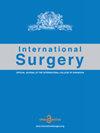Significance of neutrophil-lymphocyte ratio (NLR) as a prognostic factor in Stage II colorectal cancer
IF 0.2
4区 医学
Q4 SURGERY
引用次数: 0
Abstract
Objective : To evaluate the significance of preoperative neutrophil-lymphocyte ratio (NLR) for the analysis of disease-free survival (DFS) and overall survival (OS) in patients with stage II colorectal cancer (CRC).Summary of Background Data: Previous reports have indicated the association of NLR with a poor prognosis and tumor progression in patients with CRC. However, the role of NLR as a prognostic marker specifically in patients with stage II CRC has not been well studied.Methods : A total of 124 colon cancer patients were included in the study. The OS and DFS of patients were compared using preoperative NLR. Univariate and multivariate analyses using the Cox proportional hazards model were performed to determine the prognostic value of NLR.Results : The OS and DFS of patients with an NLR ≥ 4.0 were significantly lower when compared with those of patients with an NLR< 4.0. Multivariate analysis showed that NLR ≥ 4.0, PS score ≥ 1, and depth of tumor invasion T4 were independent prognostic factors for DFS, whereas age above 80 years, NLR ≥ 4.0, and PS score ≥ 1 were independent prognostic factors for OS.Conclusions : NLR can be considered a poor prognostic factor in patients with stage II CRC after curative surgery.中性粒细胞-淋巴细胞比值(NLR)作为II期结直肠癌预后因素的意义
目的:探讨术前中性粒细胞-淋巴细胞比值(NLR)对分析II期结直肠癌(CRC)患者无病生存期(DFS)和总生存期(OS)的意义。背景资料总结:先前的报道表明,NLR与CRC患者预后不良和肿瘤进展有关。然而,NLR作为II期CRC患者预后标志物的作用尚未得到很好的研究。方法:共纳入124例结肠癌患者。采用术前NLR对患者的OS和DFS进行比较。采用Cox比例风险模型进行单因素和多因素分析,以确定NLR的预后价值。结果:NLR≥4.0患者的OS和DFS明显低于NLR< 4.0患者。多因素分析显示,NLR≥4.0、PS评分≥1、肿瘤浸润深度T4是DFS的独立预后因素,而年龄≥80岁、NLR≥4.0、PS评分≥1是OS的独立预后因素。结论:NLR可被认为是II期结直肠癌患者术后预后不良的因素。
本文章由计算机程序翻译,如有差异,请以英文原文为准。
求助全文
约1分钟内获得全文
求助全文
来源期刊

International surgery
医学-外科
CiteScore
0.30
自引率
0.00%
发文量
10
审稿时长
6-12 weeks
期刊介绍:
International Surgery is the Official Journal of the International College of Surgeons. International Surgery has been published since 1938 and has an important position in the global scientific and medical publishing field.
The Journal publishes only open access manuscripts. Advantages and benefits of open access publishing in International Surgery include:
-worldwide internet transmission
-prompt peer reviews
-timely publishing following peer review approved manuscripts
-even more timely worldwide transmissions of unedited peer review approved manuscripts (“online first”) prior to having copy edited manuscripts formally published.
Non-approved peer reviewed manuscript authors have the opportunity to update and improve manuscripts prior to again submitting for peer review.
 求助内容:
求助内容: 应助结果提醒方式:
应助结果提醒方式:


